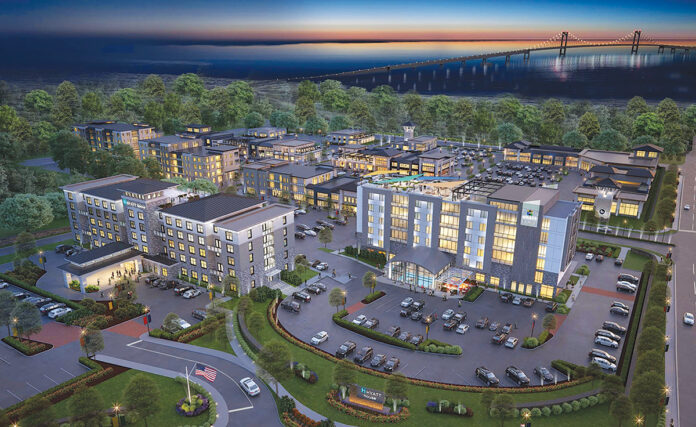Incoming Newport Mayor Xaykham “Xay” Khamsyvoravong looks at the hulking, windowless building that once housed the Newport Grand casino, and he sees a lot of potential.
The 116,000-square-foot building and a vast 6-acre parking lot have sat empty for four years, ever since previous owners opened the Bally’s Tiverton Casino & Hotel and vacated the old slot parlor on the city’s North End.
The property “has the potential to revitalize the North End, but it is critical that we get it right,” said Khamsyvoravong, who was elected to the City Council in November and appointed mayor by the incoming council members. “Our space for development is a finite resource.”
Indeed, there has been no shortage of time to plan. But there has been little consensus on how the land should be used, as officials and community advocates grapple with how to diversify the local economy beyond tourism, while also dealing with rising costs of living and a perceived lack of opportunity for low-income residents.
More than three years ago, the owner of the former Newport Grand property – Carpionato Group LLC – unveiled $100 million plans to build two six-story hotels, two six-story apartment buildings and 160,000 square feet of commercial space, a project that supporters argued was in line with the city’s desire to revamp the North End, a historically underserved and isolated section of Newport.
It was to be the largest private development in the city’s history, an anchor for an innovation district established in 2017. Carpionato estimated the city would receive $1.5 million in new tax revenue annually when the project was completed, in addition to hundreds of jobs and desperately needed housing. In addition, the development would be able to capitalize on the $85.5 million realignment of the Claiborne Pell Bridge approaches that would improve access to the North End. The bridge project will be completed in 2024.
During public hearings before the Planning Board in 2019, Carpionato requested a “float” zone that would allow for residential units, a use that at the time was not allowed in the commercial-industrial district.
After some pushback from city residents unhappy with the scope and size of the design, the City Council instituted a six-month development moratorium.
Carpionato attorneys objected, arguing the company was being singled out. In the meantime, the city updated its Comprehensive Plan and instituted new regulations under a North End Urban Plan that allowed mixed uses but set new approval processes for developments.
Jeff Brooks, Newport Planning Board chairman, says he supported the land use updates, which foster a mixed-use, urban center that prioritizes open space, accessibility and the recruitment of workers from the green and blue economies.
“When the bridge realignment is completed, the entire North End will be set up and ready to go for a full redevelopment,” he said. “And everyone will get to participate in a way that is advantageous to developers and the community, to find a medium where everybody wins.”
Not everyone was in favor of the moratorium. Then-Mayor Jeanne-Marie Napolitano was against the move, calling it a “blunt instrument” that would needlessly postpone private investment in the North End.
It has certainly postponed redevelopment of the Newport Grand property, which the city says has an assessed value of $8.8 million. Carpionato hasn’t returned with another proposal even though the moratorium ended a few years ago and the city adopted the North End Urban Plan into the city’s Comprehensive Plan in February 2021.
WPRI-TV CBS 12 reported in September that Carpionato was nearly ready to unveil a modified plan, but the developer did not respond to repeated requests from PBN for comment on the status of the property. Meanwhile, city spokesperson Thomas Shelvin said that, as of Dec. 7, the Planning Department had not received updated filings from Carpionato.
Newly elected City Councilor Mark Aramli, CEO of BedJet LLC, a North End business, says elected officials should work closely with Carpionato to get the development approved. Aramli is critical of the moratorium, saying the city should have allowed the project to move through the usual development plan review channels, especially given the workforce housing crisis on Aquidneck Island.
“That was not a good decision to have one-third of the city shut down from development for two years. We’ve been left with a massive property that is basically blighted,” he said.
Aramli agrees with some of the criticisms of the initial Carpionato proposal, which many found out of sync with Newport’s character.
“Development is not a bad thing,” he said. “It just needs to be managed to fit into the city’s architectural fabric. This is one of the last silver bullets Newport has left to solve the housing shortage.”
Khamsyvoravong said the opportunity is too important to gamble away.
“Any project of this scale, particularly at the gateway to the city, needs to be thoroughly planned,” Khamsyvoravong said. “That means taking into consideration the impact on residents, property owners, developers and potential industries who will utilize this space to make sure we are maximizing its use.”














The handling of tis project especially the moratorium clearly shows that Newport officials have no vision and are typical bureaucrats and operate with a negative perspective like all naysayers always do.